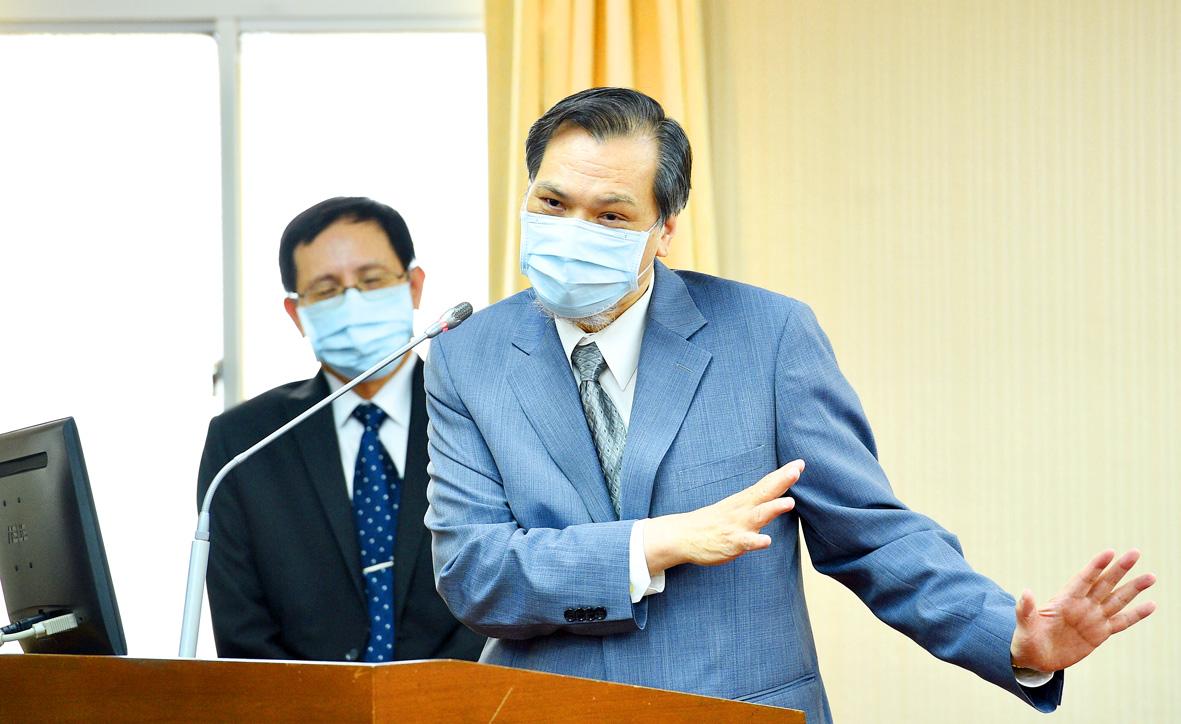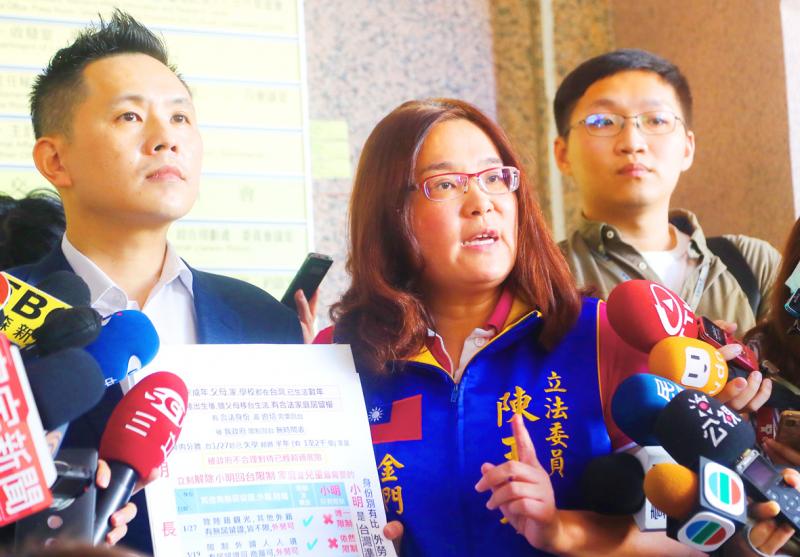The Taiwan International Student Movement yesterday said it would protest today outside the Ministry of Education in Taipei against a policy that excludes some Chinese students from returning to Taiwan amid the COVID-19 pandemic.
Since June 17, the ministry has allowed foreign students from 19 “low risk” and “medium-low risk” countries and regions to enter Taiwan.
On July 22, it announced that it was relaxing restrictions to include students from all countries and regions who are graduating this semester and on Wednesday it further expanded entry to students enrolled in degree programs.

Photo: Peter Lo, Taipei Times
A letter sent by the ministry on Wednesday to universities did not exclude students from China.
However, speaking to reporters later that day, Deputy Minister of Education Lio Mon-chi (劉孟奇) said that due to “cross-strait related” considerations, only Chinese students who are graduating this semester would be allowed to return.
The students’ group criticized the policy on Facebook, calling the exclusion of Chinese students an example of politics overriding the right to study.

Photo: CNA
Another students’ group said that only students from China, Hong Kong and Macau have been subjected to the most stringent entry restrictions, while students from many high-risk countries and regions have be allowed to enter Taiwan.
Chinese students should not been blocked due to political factors, the second group said.
Quarantine-related costs for overseas students are too high, both groups said, adding that staying at a disease prevention hotel for 15 days, and paying for meals, could cost several tens of thousands of New Taiwan dollars.
The ministry should subsidize these costs for overseas students, especially those with financial troubles, the groups said.
Mainland Affairs Council Minister Chen Ming-tong (陳明通) yesterday said that since Taiwan on July 20 opened the door to Chinese students who are to graduate this semester, only 29 of approximately 3,000 who qualify have returned.
The council doubts whether Chinese authorities would let them come, Chen said.
The goal was to allow Chinese students and children with one Taiwanese and one Chinese parent to return, he said, adding that policy adjustments would be made based on developments amid the pandemic.
The council on Wednesday night said that there have been several cases recently of Chinese authorities preventing Chinese students from traveling to Taiwan.
As this has happened to Chinese students who urgently need to return to Taiwan to complete their studies, it is difficult to believe that Chinese authorities would allow others who are not to graduate soon to return, the council said.
National Taiwan University yesterday said in a statement that it “deeply regrets” the ministry’s decision not to include Chinese students in its latest policy.
Additional reporting by Chung Li-hua and Sherry Hsiao

TRAGEDY STRIKES TAIPEI: The suspect died after falling off a building after he threw smoke grenades into Taipei Main Station and went on a killing spree in Zhongshan A 27-year-old suspect allegedly threw smoke grenades in Taipei Main Station and then proceeded to Zhongshan MRT Station in a random killing spree that resulted in the death of the suspect and two other civilians, and seven injured, including one in critical condition, as of press time last night. The suspect, identified as a man surnamed Chang Wen (張文), allegedly began the attack at Taipei Main Station, the Taipei Fire Department said, adding that it received a report at 5:24pm that smoke grenades had been thrown in the station. One man in his 50s was rushed to hospital after a cardiac arrest

A car bomb killed a senior Russian general in southern Moscow yesterday morning, the latest high-profile army figure to be blown up in a blast that came just hours after Russian and Ukrainian delegates held separate talks in Miami on a plan to end the war. Kyiv has not commented on the incident, but Russian investigators said they were probing whether the blast was “linked” to “Ukrainian special forces.” The attack was similar to other assassinations of generals and pro-war figures that have either been claimed, or are widely believed to have been orchestrated, by Ukraine. Russian Lieutenant General Fanil Sarvarov, 56, head

SAFETY FIRST: Double the number of police were deployed at the Taipei Marathon, while other cities released plans to bolster public event safety Authorities across Taiwan have stepped up security measures ahead of Christmas and New Year events, following a knife and smoke bomb attack in Taipei on Friday that left four people dead and 11 injured. In a bid to prevent potential copycat incidents, police deployments have been expanded for large gatherings, transport hubs, and other crowded public spaces, according to official statements from police and city authorities. Taipei Mayor Chiang Wan-an (蔣萬安) said the city has “comprehensively raised security readiness” in crowded areas, increased police deployments with armed officers, and intensified patrols during weekends and nighttime hours. For large-scale events, security checkpoints and explosives

PUBLIC SAFETY: The premier said that security would be tightened in transport hubs, while President Lai commended the public for their bravery The government is to deploy more police, including rapid response units, in crowded public areas to ensure a swift response to any threats, President William Lai (賴清德) said yesterday after a knife attack killed three people and injured 11 in Taipei the previous day. Lai made the remarks following a briefing by the National Police Agency on the progress of the investigation, saying that the attack underscored the importance of cooperation in public security between the central and local governments. The attack unfolded in the early evening on Friday around Taipei Main Station’s M7 exit and later near the Taipei MRT’s Zhongshan